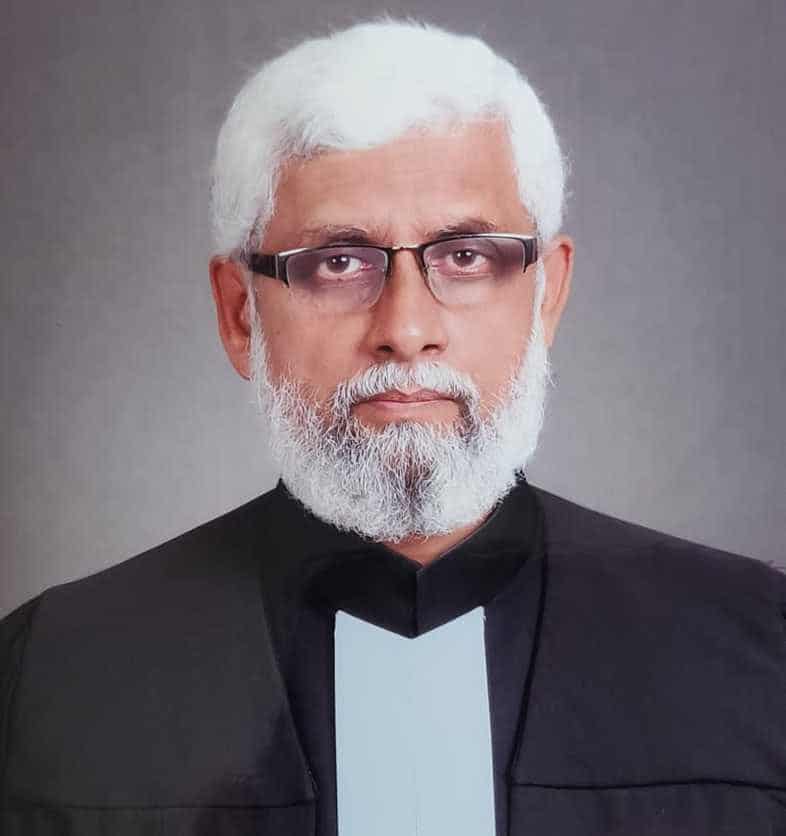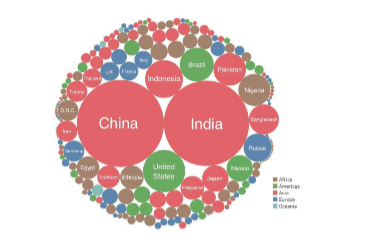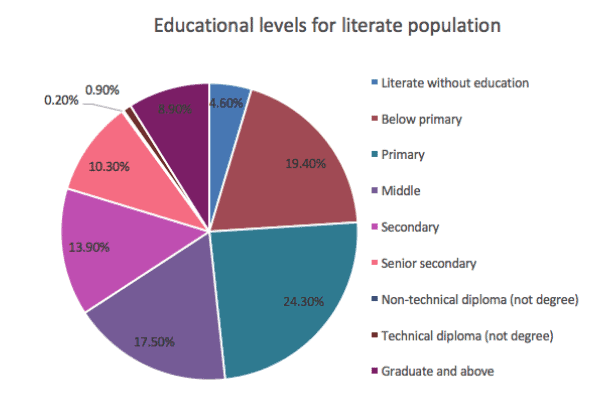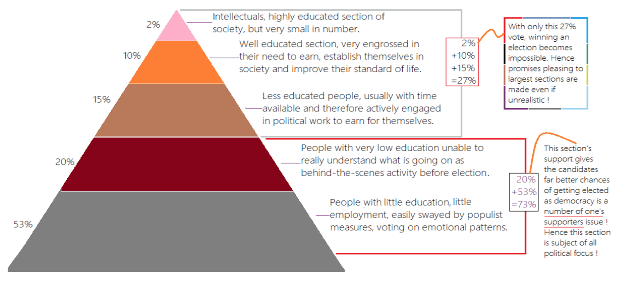
“Why Does the Stone Pelting in Kashmir Never Stop? Read how stone pelting has been encouraged in Kashmir” by Rajat Mitra (myind.net), says millions of stones have been hurled at our army men, police and innocent people including children. He says it calls for introspection, that earlier when stones were hurled Mehbooba Mufti never thought… then he says, “No wonder that only recently she forgave hundreds of stone pelters and gave them amnesty believing their hearts have reformed.”
The withdrawal of all criminal cases against a certain political party’s high-profile echelons does not bother him: is it bias or inadvertence? Revealingly, he blusters “…stone pelting at Indians is Kashmiri youths’ national pastime, an obsession that has been taught to them…” Ah! So, Kashmiris pelting stones at Indians, eh? Kashmiris are distinct from Indians? Now, to fools like me (ill-informed, stupid, and anti-national in the eyes of the learned Gurus of the Gestapo) this dovetails beautifully with what various other equally ill-informed, stupid, and allegedly anti-national persons have been saying: that Kashmiris are integral to Kashmir, and the moment one creates or asserts a dichotomy between Indians and Kashmiris one legitimises the stand that one wants only the land that is geographical Kashmir but has no interest in the population, which in turn tends to legitimise the stand that one is an occupying force. Before one states what is today the popular populist version of pseudo nationalism, one doesn’t seem to think things through, does one?
In November, India’s representative at the UN asserted the body needs reform and some states are stalling it. The UN ought to be a body representative of the people, as units, not nations as units, for after China, permanently on the Security Council, India has the largest population. One image from the net illustrates this :

The population, not the military might of WW-II should determine who has what voting rights. And the right represents the right of self-determination which we all as people of the world should be able to exercise in the world body.
As population, not the military might of WW-II should determine who has what voting rights in a reformed UNGA and UNSC, so should the citizens of each country have the right to determine the direction their nations shall take. And the citizens’ right to seek accountability from their elected representatives? How about electoral reform closer home?
That presents a problem. If we assume all people make equally educated decisions and choices we commit an error. If we assume educated people make better decisions and choices we commit another. If we assume unaware people are as entitled to make decisions and choices that impact the entire community or country, as are those who are aware, we commit yet another. As the Qur’an implicitly asks, do the blind and those who can see the road ahead, of equal standing in deciding which way to travel? How then do we resolve the conundrum?

We have an issue when we read “One, with the law, is a majority.” We have an aggravation of the issue when we learn that the law itself is a creature of minds that have not necessarily taken into account the stakeholders’ views. The legislation that the farmers are agitating against: does it factor in the farmers’ views? The issue of MSP (minimum support price) there is deflected by the government which claims the idea is to eliminate middlemen that collect 640-odd crores each year, which money should rightfully go to the farmers. If that was the case why would the farmers, richer by 640-odd crores be protesting, water cannons, cold weather, blockades, barricades and all? The farmers contend the simple resolution is to say the MSP shall remain, and anyone who buys agricultural produce shall buy it at that as the lowest possible price. Why, they ask, is it made possible for big corporates to have a monopoly in buying agricultural produce, eliminating the market creating a monopoly, violating the Competition laws, leaving them with the twin alternatives of either allowing their agricultural produce to rot unsold, or sell to big corporates at prices they shall fix? Why does the government not declare MSP shall prevail? Why legislators in assemblies are claiming this is a ruse, and the government that has sold PSUs to big corporates is now aiming to create the circumstances for them to take over agricultural land as well? What are the facts? More important, are parties in power honouring election promises?
The levels of possession of material wealth, give a pyramid type image.

And when we try and understand who would desire what and therefore vote for, we have an approximation that is something like this :
This concept of democracy is warped, for levels of education and awareness also create a pyramid type image for what we have as electorate:

Now, when electioneering commences, the moon and the sun are both assured to voters, the poorest and least aware fall for falsehoods and take the bait. Someone tried to stop it demanding false, fanciful promises should be banned.
The Lucknow Bench of Allahabad High Court agreed: Ajmal Khan v Election Commission of India, (Civil Misc. Writ Petition (M/B) No. 21017 of 2016), 2016 0 Supreme(All) 1473, A.P. Sahi and Dr. Vijay Laxmi, judges, agreed.
The Karnataka High Court: Akhila Karnataka Police Maha Sangha (R), Bangalore v B. S. Yediyurappa & Others, 2008 0 Supreme(Kar) 814 had differed, holding “it is clear that the grievance of the petitioner and the relief sought for is based on the political promises made …during the election campaign on the political platforms. The disputes of political nature… cannot be resolved under Articles 226 and 227 of the Constitution of India as this Court is not expected to enter into any such political thicket.”
The Lucknow Bench of Allahabad High Court this time (Pankaj Kumar Jaiswal, Rajnish Kumar, judges) found itself in agreement with the latter view: Vivek Kumar Mishra v U.O.I. Cabinet Secy Ministry of Parliamentary Affairs, (PIL Civil No. 11814 of 2019), 2019 0 Supreme(All) 532.
It quoted Lord Denning (Brobley London Borough Council Vs. Greater London Council, (1982) 1 AllER 129) “A manifesto issued by a political party, in order to get votes, is not to be taken as gospel. …It may contain, and often does contain, promises or proposals that are quite unworkable or impossible of attainment…When the party gets into power, it should consider any proposal or promise afresh, on its merits, without any feeling of being obliged to honour it or being committed to it” with approval, ignoring what Denning the jurist had earlier (Seaford Court Etates Ltd. Vs. Asher, (1949) 2 AllER 155 as reproduced in 2001 (42) ACC 108) said viz., “When a defect appears a judge cannot simply fold his hands and blame the draftsman. He must set to work on the constructive task of finding the intention of Parliament, and then he must supplement the written word so as to give “force and life” to the intention of the legislature. A judge should ask himself the question how, If the makers of the Act had themselves come across this ruck in the texture… He must then do as they would have done. A judge must not alter the material of which the Act is woven, but he can and should iron out the creases.”
The High Court of A.P. also concurred: A. P. Sampoorna Madya Nisheda Samithi v State of A.P. 1997 0 Supreme(AP) 460, S.Mishra, S.Parvatha Rao, S.S.M.Quadri, V.Bhaskara Rao, judges, W.P.No.7687/97 &batch, holding “a promise or proposal in the election manifesto cannot provide to those who vote for a political party a right to claim that the elected representatives must implement the manifesto… if they do not implement it”.
Let me make it simple. When you seek votes, you can promise Rs.15 lakhs in every person’s account, promise to get back funds stashed abroad, promise the sun and the moon, and all of it can be moonshine, and none of it need bother you once you have won the election. The Law has spoken!
Given the above pyramids, any election will deliver results that will favour the biggest dream-sellers ensuring the nation has nightmares. Target the gullible, the ones who have nothing, who will vote for you if you talk their language… what gives the biggest kick? Power. Talk empowering stuff. Tell them they have been treated badly by those who are not of their type. Promise them revenge. Drive wedges between them. Drive resentment between haves and have-nots. Promise equitable distribution of wealth. Promise lower food prices. Promise pensions. Promise political salvation. Promise majoritarianism. Get votes. Sit tight. So, quo vadis, democracy?
Reforms are demanded right left and centre in Muslim Law. Human rights are leveraged. Bombast fuels more bombast, and the cacophony (quite phoney, of course) gets red letter treatment. Shouldn’t there be demands for reform in electoral laws, making it mandatory for political parties to state what they intend, deliver within assured time-frames, or held by their very inability to have forfeited right to govern, and deemed to have resigned en masse?
When Courts have ruled election manifestos can contain flights of fancy, can one reasonably expect politicians to legislate, against themselves, against their present absolute licence to er…deviate from the truth, that politicians shall not lie in election promises? Did the Constituent Assembly intend to allow false promises to be the launching pad of political careers fooling the populace? As Justice Krishna Iyer said famously, “Legislative futility must be eliminated so far as interpretative possibility permits.”
As the saying goes, “The master’s tools will never dismantle the master’s house.” It remains for the citizens to demand a workable system that holds politicians to their promises. The nation deserves that as the very least, if the future is to be what we want our children to see, experience and live.
What would be the correct interpretation of the electoral process? What can judges do since they cannot legislate but can only interpret? Well, read this:
A rich man, near death, called a wealthy acquaintance, and said “My children are minors. By my will I entrust this sack of gold to you. When they come of age, call them and give them whatever you desire of it. The rest is yours.” He having died, when they were of age the trustee called the children and gave them the empty sack. Overruling protests, he claimed he was doing what the will empowered him to. The matter went to jurist Abu Hanifa, who had the will read, then asked the man what his decision was. The man replied he would keep the gold. Abu Hanifa decreed the gold would go to the decedent’s children, the empty sack to the man. Asked how, he replied “Read the will again: it instructs ‘give them whatever you desire of it’: you desire the gold, so you must give it to them.”
Lesson for Kalyug: the judges must interpret the written word to give life to it, not render it otiose and the legislative intent negated. Procedure is the handmaiden of justice, not its mistress, goes the maxim. Judges are not beholden to Parliament but empowered to reverse legislative misadventures.
Will they? The citizens want to know.
Jai Hind.
Shafeeq R. Mahajir is a well-known lawyer based in Hyderabad

